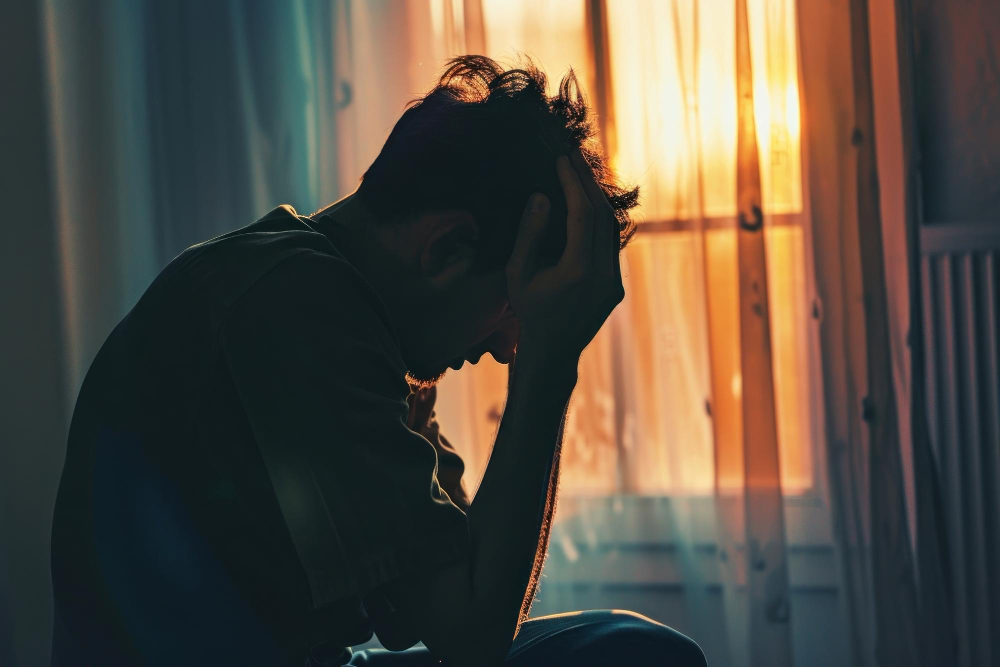Depression is more than just feeling sad. It’s a serious mental health issue that affects how you think, feel, and live your daily life. Many people around the world—and in India—experience depression, but not everyone talks about it.
The good news? Help is available, and healing is possible. Let’s break it down in simple terms and understand how to deal with depression step by step.
What Is Depression?
Everyone feels low sometimes. But depression is when that sadness:
- Stays for weeks or months
- Affects your sleep, appetite, and energy
- Makes it hard to enjoy life, work, or relationships
Depression often comes with anxiety, making things feel even heavier. But once you know what’s going on, you can take steps to feel better.
Why Don’t People Talk About It?
In India, talking about mental health was once seen as shameful. Many thought of it as a “weakness” or “bad phase.”
Some even thought it was:
- Karma or spiritual punishment
- Something to hide from society
- Just attention-seeking
Thankfully, things are changing. Today, more people are speaking openly and understanding that mental health is just as important as physical health.
What Happens in the Brain During Depression?
Depression is not “all in your head.” It’s also about what’s happening inside your brain.
When someone is depressed:
- Chemicals in the brain get out of balance
- This affects emotions, energy, and thinking
- It makes it harder to feel happy or hopeful
Doctors and researchers now understand this better, so they can offer better treatment options.
Everyday Habits That Add to Depression
In today’s world, we’re always busy—and that can affect our mental health.
Things like:
- Too much screen time
- Lack of sleep
- Social media pressure
- Long work/study hours
- Comparing ourselves to others
…can slowly build up and make us feel stressed, tired, or hopeless.
But small changes in your lifestyle can help in a big way.
Early Signs of Depression to Watch For
Recognizing the signs early can make a big difference. Some signs to look out for:
- Feeling sad or empty most of the time
- Not enjoying things you used to love
- Trouble sleeping or sleeping too much
- No energy, even after resting
- Changes in eating habits
- Avoiding people or isolating yourself
If these feelings last more than 2 weeks, it’s time to reach out for help.
Treatment Options Available in India
There are many ways to treat depression. What works best depends on the person.
Here are some common approaches:
- Counselling or therapy: Talking to a trained mental health professional
- Medicines: Sometimes needed to balance brain chemicals
- Lifestyle changes: Exercise, better sleep, healthy diet
- Combining therapies: A mix of talk therapy and medication often works best
The important thing is: You don’t have to figure it out alone. Help is available.
Let’s Break the Stigma
Many people don’t seek help because they feel embarrassed or scared.
But mental health is nothing to hide. We go to a doctor for a fever—why not for sadness or stress?
Talking about depression openly:
- Helps others feel safe to share
- Builds support in families and communities
- Reduces fear and shame
Let’s create a culture where it’s okay to ask for help.
How Lifestyle Changes Can Help
Small steps make a big difference:
🧘♂️ Exercise
- Walking, dancing, or yoga boosts your mood naturally
- Even 15-20 minutes daily helps
🍲 Healthy Food
- Nutritious meals improve energy and brain health
- Include fruits, vegetables, nuts, and water
😴 Better Sleep
- Set a regular bedtime
- Limit screens before bed
These changes support both your mind and body.
Using Spiritual & Traditional Practices
In India, we have access to amazing traditional tools like:
- Yoga & meditation: Helps reduce overthinking and brings calm
- Breathing exercises (pranayama): Slows down racing thoughts
- Spiritual routines: Chanting, prayer, or quiet time can bring comfort
These don’t replace therapy—but they work beautifully together.
When Should You Talk to a Professional?
If you feel like:
- “Nothing makes me happy anymore”
- “I cry often for no reason”
- “No one understands me”
- “I just want to be left alone”
Please reach out to a psychologist, counsellor, or psychiatrist. It’s not a sign of weakness—it’s the first step toward healing.
Online therapy options, helplines, and support groups are now easy to access in India.
What About Teenagers & Young Adults?
Many students and young professionals feel:
- Pressure to perform
- Fear of disappointing family
- Social comparison on social media
All of this builds up and can lead to stress, anxiety, or depression. Parents and teachers should stay alert and offer emotional support early on.
Real People, Real Recovery
Many people have battled depression and come out stronger.
Some left toxic workplaces, found supportive friends, or simply got professional help. Their stories give us hope that things can get better.
Let’s create more safe spaces where people can share and support each other.
Final Words: Be Kind to Yourself
Depression is not your fault. It’s not about being lazy or weak. It’s a condition—and it can be treated.
If you or someone you know is struggling:
- Speak up
- Reach out
- Start small
- Don’t give up
🌟 Healing takes time, but it’s possible. With the right support, you can feel better and live fully again.

